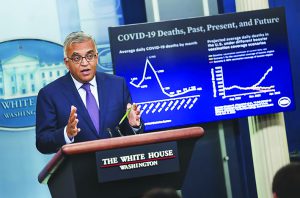Lisa Jarvis
Two new, small studies are stirring up more controversy over the new Covid boosters, updated to match the omicron BA.4 and BA.5 strains. The research suggests the shots are no better than old boosters.
But that doesn’t mean we should write them off — and certainly doesn’t mean that getting one won’t save lives. The studies are small, and data might have been collected too soon to truly demonstrate their value.
The wisdom over the US plan for fall boosters has been hotly debated pretty much from its inception. Pfizer and Moderna spent months testing a booster based on an earlier omicron variant, but by the time regulatory authorities needed to make a decision on the composition of fall boosters, BA.4 and BA.5 had taken over. The Food and Drug Administration asked the companies to change course and make shots targeting those highly contagious omicron family members.
But the FDA’s request came in late June, too late for clinical tests of those vaccines to be run before fall booster season. So the agency authorized the BA.4/BA.5-targeted shots prior to having data on their efficacy — a decision some public health experts, including one of the agency’s own vaccine advisors, sharply criticized, but a choice that allowed the public to get the new jabs before a winter wave.
Two things happened next. The Biden administration, without actual data on the shots, overpromised on what the bivalent boosters could offer. And scientists skeptical of their benefits, particularly in people who are at lower risk of serious infection, continued to air concerns over their rollout — and were ready to pounce on data that validates their position.
Neither approach is helpful. Government officials oversold the shots’ ability to better protect against both current and future omicron variants and suggested their protection could last through next fall without actual data to back up those claims. That approach could backfire if people wind up needing another dose in the spring or the shots need further refining as new variants emerge. And rushing out preliminary data on the shots’ value — and media outlets covering that data without the proper context — could discourage an already vaccine-weary public at a time when a winter Covid wave is likely approaching. As of last week, just 19.4 million out of the more than 226 million people who are eligible had received the new booster.
First, let’s make one thing clear: People who are due for a booster are not worse off for having gotten the bivalent one. The question is whether they are better protected than they would have been if given a booster with the original formulations.
The answer to that question is still up in the air. The two studies that emerged this week found that people who got the updated bivalent boosters produced a similar level and mix of neutralizing antibodies (the immune system’s first line of defense) as people who received another dose of the original booster.
But there are some caveats to consider. These studies were very small, looking at just a few dozen people between them. And there’s reason to believe that the immune system needs time to learn how to build better defenses — that in response to an updated vaccine or infection with a new variant.
—Bloomberg
 The Gulf Time Newspaper One of the finest business newspapers in the UAE brought to you by our professional writers and editors.
The Gulf Time Newspaper One of the finest business newspapers in the UAE brought to you by our professional writers and editors.
